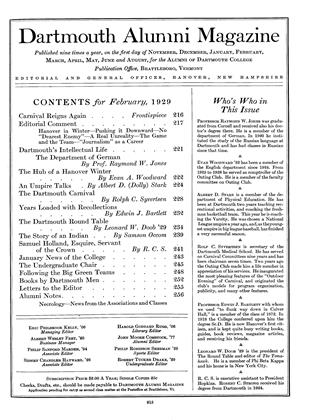By Alexander Laing. Doubleday, Doran & Company. $1.75.
Alexander Laing, of the class of '25, has published a book of verse to which, in memory of Housman, he has given the modest- if somewhat cynical—title Fool's Errand. The poems are reprinted from The Arts Anthology, Dartmouth, 1925, a little volume of Hanover Poems by Lattimore and Laing, and from periodicals including The Bookman, TheCentury, The Independent, Poetry, The Saturday Review of Literature, and others. The thirty-seven poems which Mr. Laing has gathered to make his booklet interest the present reviewer for two reasons: first, because of a very genuine personal liking for the author, and second, because the changing tone of this four or five years' poetic output suggests certain pertinent reflections.
A recent review of the book, though speaking in affable terms, did little more than note an obvious indebtedness to Housman. Now the indebtedness is there. Mr. Laing himself avers it. But, what is much more important, the later work shows an increasing independence, a more individual speaking voice, and a clear tendency to get out from under the pleasant but short-flighted cynicism with which Housman met the literary and philosophical confusions of the Nineties. In a time of shifting values, intelligent youth, if it is really hungry for truth, must first pass from doubt to cynicism, because cynicism is the most obvious defence of a sensitive and eager spirit. But if that spirit is eager enough, and strong enough, and backed by sufficient physical vitality, it must in time set out upon a reconstruction of its own. Not until this reconstruction is actively under way does this spirit—if it be articulate at all—begin to find its own voice. And we are forced to wonder whether at the present moment of confusions the finding of this voice is not being abnormally delayed
As for Mr. Laing, the reading and re-reading of these poems, in the light of what we know of their chronological sequence, convince us that he has sufficient desire and persistence, and sufficient spiritual and physical vitality, to push through to certain constructive patterns of his own,
"To crystallize the contour and the curve Of sudden music stirring in the brain."
"Mountain Moment," "Twenty-Second Spring," the sonnet beginning "There is a vale in Hanover," and the vigorous sonnet entitled "For an Educator," speak most personally to us of Dartmouth, but it is in "The Half-Remembered" and "The Coming of the Sun" that the surer voice begins to be articulate. Most of the poems in this little book are purely subjective—in intent if not in subject. That, of course, is to be expected in any young writer of the present day. When Mr. Laing has measured himself against an objective theme which demands an objective expression of a philosophy of life and demands it in a large way, we shall know better what he has it in him to do and be.
This present reviewer, judging by the hints in Fool's Errand, believes that Mr. Laing has the desire, has the keenness of mind, has the perseverance, and, above all, has the healthy vitality to continue the search until he finds something very genuinely worth crystallizing. For, as he suggests, only ". . .a spirit that has come to calm Through courage and the beauty of the world, Can aid its fellows, tangled in the charm Of fear."
 View Full Issue
View Full Issue
More From This Issue
-
 Lettter from the Editor
Lettter from the EditorEditorial Comment
February 1929 -
 Article
ArticleThe Dartmouth Round Table
February 1929 By Leonard W. Doob '29 -
 Article
ArticleThe Dartmouth Carnival
February 1929 By Rolph C. Syvertsen -
 Article
ArticleAn Umpire Talks!
February 1929 By Albert D. (Dolly) Stark -
 Article
ArticleThe Story of an Indian
February 1929 By Samson Occom -
 Class Notes
Class NotesCLASS OF 1923
February 1929 By Truman T. Metzel
David Lambuth
-
 Article
ArticleANOTHER REPORT TO THE ALUMNI
May 1921 By DAVID LAMBUTH -
 Books
BooksALUMNI PUBLICATIONS
March, 1924 By David Lambuth -
 Books
BooksFACULTY PUBLICATIONS
March, 1924 By David Lambuth -
 Books
BooksTHE DARTMOUTH MURDERS
January, 1930 By David Lambuth -
 Books
BooksMAURICE HEWLETT: HISTORICAL ROMANCER
January 1939 By David Lambuth -
 Article
ArticlePRINCIPLES OF COMPOSITION AND LITERATURE
December, 1914 By Robert Huntington, DAVID LAMBUTH
Books
-
 Books
BooksFACULTY PUBLICATIONS
July 1920 -
 Books
BooksA second edition, revised and enlarged
April 1931 -
 Books
BooksEDUCATION FOR FREEDOM AND RESPONSIBILITY.
April 1953 By A. O. Davidson -
 Books
BooksTHE THEORY OR RESONANCE AND ITS APPLICATIONS TO ORGANIC CHEMISTRY
May 1945 By Andrew J. Scarlett '10 -
 Books
BooksCLINICAL TOXICOLOGY OF COMMERCIAL PRODUCTS. ACUTE POISONING (HOME AND FARM).
MARCH 1965 By Lours B. MATTHEWS JR. M.D. -
 Books
BooksWords of Wisdom
MAY 1984 By Peter Smith

